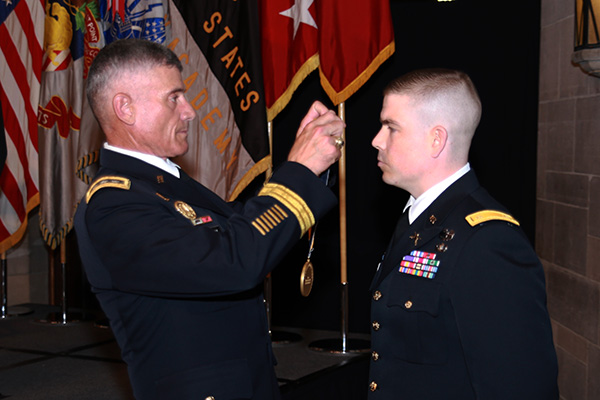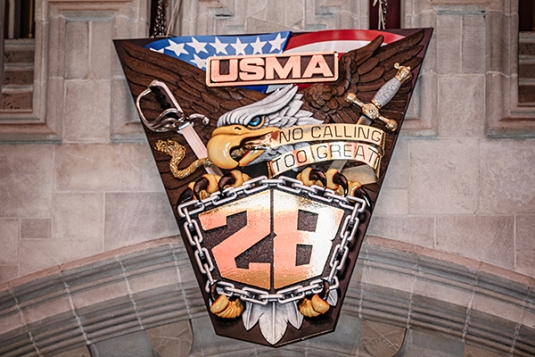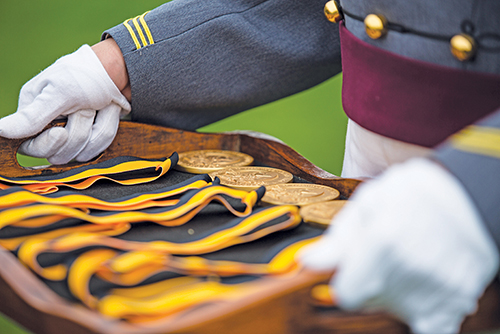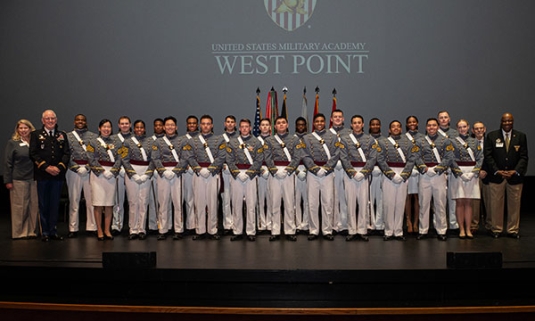On the morning of April 4, 2004, the Soldiers of Company C, 2nd Battalion, 37th Armored Regiment were in a great mood. Having been part of Operation Iraqi Freedom for nearly a year, they had turned in their tank’s main ammunition days prior, expecting a move from Camp War Eagle in the Sadr City section of Baghdad to Kuwait. This was to be their last official duty day in Iraq. “We were about to turn into a pumpkin,” said Major Christopher P. Dean ’02, who was a first lieutenant and the unit’s platoon leader on that fateful day. “We had ceased all patrols and were all sitting around on cots saying, ‘We’re done!’ and then the radios opened up in the TOC.”
A week earlier, the U.S. overseer of Iraq ordered a 60-day closure of a local newspaper, citing that it was inciting violence against Coalition forces. “This prompted wide-scale protests in the city, but no one was expecting what eventually happened,” said Dean. The Mahdi Militia, made of up of thousands of insurgents dedicated to radical Shi’ite cleric Moqtada al-Sadr, attacked Soldiers of 1st Platoon, Company C, 2nd Battalion, 5th Cavalry, who were on patrol escorting a garbage truck through an eastern district of Sadr City. The platoon suffered numerous casualties and was pinned down in continued contact.
As platoon leader of the Quick Reaction Force (QRF), Dean directed three M1A1 Abrams tanks through the narrow and debris-filled streets to the intense battle that was raging. “Not to sound cliché, but the scene was reminiscent of the film Black Hawk Down,” Dean said. “In an effort to create obstacles for our tanks the insurgents had thrown bulk items like refrigerators and sinks in the road and set tires on fire, and they fought with an intensity that showed they wanted to decimate and destroy U.S. elements.” Having already turned in their main armaments, the QRF was low on ammunition and fought most of the battle “open hatch” style, using small-arms fire. For four hours, Dean and his men engaged the enemy, inflicting great damage but suffering casualties of their own. Dean himself received wounds to the neck and his arm, and his tank’s mechanic was killed. In the course of battle, Dean dismounted from his tank and ensured the defense of the casualty evacuation site, freeing 19 isolated infantrymen from the enemy.
For his actions that day, Dean was awarded the Silver Star in July 2004 and has now been named the 2015 Alexander R. Nininger Award for Valor at Arms recipient. Presented by the West Point Association of Graduates, the Nininger Award is given to an exemplar of heroic action in battle, and its recipient becomes a representative of all West Point-commissioned officers who have heroically led Soldiers in battle. “Leading a platoon in a firefight is a straightforward endeavor,” Dean said, “but living up to representing all West Point officers is a heavy responsibility and something that I can only hope to be deemed worthy after the fact.” However, as he told the Corps of Cadets in his speech upon accepting the Nininger Award, West Point prepares its graduates to lead, no matter the task.
Dean’s speech didn’t address the conflict for which he was being recognized, but he did emphasize that the multi-faceted relationship between a leader and his or her Soldiers was the reason for his success on April 4, 2004. He ended his speech by accepting the Nininger Award on behalf of his Soldiers of Task Force 2-37 Armor. “No one second-guessed their duty that day,” Dean said prior to his speech, “and not knowing what they were going to see day after day going forward, they just went on like a well-oiled machine.”
The Corps’ reaction to Dean’s speech was overwhelmingly positive. For example, they gave him a thunderous round of applause for his first post-pleasantries line: “I must confess to you all that I was an average cadet.” They also seemed to take to heart his message regarding an officer’s pride in his or her soldiers. “It was a very moving speech,” said Cadet Donnie Goff ’16. “Major Dean did a great job reassuring cadets, firsties especially, that we are ready to lead Soldiers.” Cadet Andrew Borer ’16 also found the speech reassuring. “He captured the bigger picture that cadets are always seeking and made us realize that all these challenges we endure as cadets will help us succeed later on,” Borer said. Cadet Pete Basnight ’16 echoed his classmates saying, “When I think about what Major Dean said we will be able to achieve under stress to what we are learning at the Academy, I find his message very inspiring and encouraging.”
Endowed by E. Douglas Kenna ’45 and his wife Jean, the Nininger Award is named for Second Lieutenant Alexander R. Nininger ’41, who fought the enemy to his death during the Battle of Bataan in January 1942 and posthumously received WWII’s first Medal of Honor.
Announcement
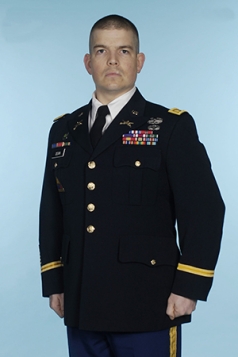
Major Christopher P. Dean is a 2002 graduate of the United States Military Academy at West Point and was initially commissioned as an armor officer. He has served over 40 months deployed in support of Operation Iraqi Freedom and has served as a Company Commander for over 47 months in four companies. Major Dean’s initial assignment was in Germany with the 2d Battalion, 37th Armor, where he served as a M1A1 Main Battle Tank Platoon Leader, Heavy Mortar Platoon Leader, Headquarters Company Executive Officer, Task Force Battle Captain, and Battalion Assistant Supply Officer. During this time, he deployed in support of Operation Iraqi Freedom I (OIF I), from May 2003 until July 2004 as a Tank Platoon Leader, where he fought and patrolled in Baghdad, Al Kut, Diwaniyah, Najaf, and Kufa. He served under more than five Task Force commands and provided much needed heavy firepower in support of American and Coalition Forces. He experienced fierce fighting against Muqtada Al Sadr’s ‘Mahdi Army’ during their uprising in April, 2004, and in Operation Resolute Sword in the following months. From January 2006 until February 2007 he served in support of OIF 06-07, and served as a Task Force Battle Captain in the cities of Tal Afar and Ramadi, Iraq, witnessing the successful conduct of GEN H.R. McMaster’s ‘Oil Spot’ vision for Tal Afar, and later the ‘Anbar Awakening’ in Ramadi. Read more here.
At the conclusion of his combat tour, he returned to Ray Barracks in Friedberg, Germany, and transitioned the post to the Hessen, Germany government in July 2007.
He was then assigned to Task Force 3-66 Armor, 172d Infantry Brigade in Grafenwoehr, Germany. In November 2008, he deployed for his third combat tour, serving as the Task Force Assistant Operations Officer for Task Force 3-66 Armor in South Balad Ruz, in Diyala province, Iraq. In March, 2009, he took command of C/3-66 Armor in Diwaniyah to train and professionalize two Iraqi Army Battalions in preparation for transition to the Government of Iraq. After completion of this tour in November 2009, he redeployed his Company to Grafenwoehr, Germany, and took command of HHC/2 28 Infantry in April 2010. In HHC/2-28 Infantry, Captain Dean deployed his company in support of ‘Task Force East’: a multinational training exercise that involved training with military units from Bulgaria and Romania in their home countries. He then prepared his Soldiers for a transition to a light infantry role and deployed his Company in support of Operation Enduring Freedom (OEF 11-12). During OEF 11-12, Major Dean served as the D/2-28 Infantry Rear-Detachment Task Force Commander, until August 2012.
Major Dean received a Master of Science degree in Nuclear Engineering from the Air Force Institute of Technology (AFIT) in 2015. He is a graduate of the Armor Officer Basic Course, Unit Movement Officer’s Course, Chemical, Biological, Radiological, and Nuclear Defense (CBRN-D) Course, Maneuver Captain’s Career Course, and Command and General Staff College Common Core. He is currently en route to taking command at the National Ground Intelligence Center in Charlottesville, VA as a Nuclear Operations, Research, and Counterproliferation Officer. His decorations to date include the Silver Star, Bronze Star Medal (2 OLC), Purple Heart, Meritorious Service Medal, Army Commendation Medal with Oak Leaf Cluster, Overseas Service Ribbon (5th Award), Combat Action Badge, and the Parachutist Badge.
Speech
Acceptance Remarks
Washington Hall, West Point, New York
September 24, 2015
General and Mrs. Caslen, Colonel McClure, Ms. Houlihan, distinguished guests, and members of the Corps of Cadets, thank you. I am honored to represent all West Point graduates who have led Soldiers in battle…and, I am awestruck to stand here before you as the tenth recipient of the Nininger Award for Valor at Arms. I pledge to do my best to live up to the virtues symbolized by this medallion and its namesake—Lieutenant Sandy Nininger of the class of 1941.
First of all, I must confess to you all that I was an average cadet.
In fact, my roommates would tell you that my graduation was not guaranteed until I walked up the ramp and grasped my diploma. My Graduation Day, now thirteen years ago, was one of the best days of my life. Since then, I have often realized how much I learned here in my four years, and that topic is the heart of my message to you this evening.
My remarks will be brief, and I won’t tell you any war stories. However, I would like to share with you some of the things that quickly became second nature to me as a result of my education and training here.
To begin, allow me take you back in time…
During spring break in 2001, I went on a DMI trip section to Europe. Along with a few other cadets, I visited Army units in Germany and Bosnia. One day, we observed a Fifth Corps command post exercise. After the exercise, our DMI instructor, Lieutenant Colonel Levy, called us to assemble at the map. Then, he took his pointer and put the tip on a salient in the corps front line and said to us…
…during a corps attack, there is a lead division.
…that lead division has a lead brigade.
…and in that brigade is a lead battalion.
…and, as you might guess, that battalion is led by a company that has designated a lead platoon.
…and what this means is: at the lead of an American attack of any scale there is a platoon leader—a platoon leader and his or her Soldiers are the tip of the American spear.
Tonight, my goal is to assure you that you are being well prepared to be THAT platoon leader—the one whose Soldiers form the steely tip of America’s spear.
As you settle into your first platoon, you’ll be surprised at how much you know about leading it. Some of your knowledge will be technical or factual, and some will be instinctual. The combination will keep you on the right azimuth.
For example, on the day that you meet your platoon:
You will know that trust is critical. You will know to observe the group dynamics and that your Soldiers are sizing you up as well. From Day 1, nurturing trust within your platoon will become an essential objective of your leadership, which will no longer be an academic concept.
You will also know that you must motivate yourself and your troops to do the mundane things: to endure long meetings, persevere through maintenance Mondays, and receive the obligatory safety briefings.
And you will know to share hardships with your Soldiers. When a repair part for a deadlined vehicle arrives at 1600 hours on a Friday, you will stay with your Soldiers in the motor pool. You might not be THE top technical expert in your platoon, but you will know that you can help drag track sections or operate an impact wrench…and that your wallet can handle a platoon’s worth of pizzas. And then, when the work is done, you and your Soldiers will leave the motor pool together. At that point, you will also recognize that you intuitively knew how to strike a balance between leading your Soldiers and being their servant.
And I would like you to know that you will understand the value of empathy…doing what you can to lift the spirits of the specialist whose high school girlfriend, the one he was sure he was going to marry, has moved on to someone else. You will also listen patiently to your go-to NCO when he’s complaining about his divorce, because you know he needs to vent…And when Jones gets a “no pay due” LES, and he can’t fight that battle himself: you and your platoon sergeant will help him file the pay inquiry.
The long days and nights with your Soldiers will forge your team. You will enjoy laughing at their high school pranks, the stories about how they crashed their first car, and hearing about which new video game is “the new hotness,” [surveying crowd: Does anybody even SAY that anymore?]
…but you will also hear about hard childhoods in poor communities, and how the Army provided many of your Soldiers a path to a brighter future. And, often, you will be struck by the purity of their patriotism.
You will balance this team-building with a fanatical passion for the tools of your trade—your branch. Your Soldiers will sense that passion and do their best to achieve the standards you set, so that, individually and collectively, they will have the skills and cohesiveness needed…as a team…at the tip of the spear…to prevail against a ruthless enemy who is the embodiment of evil.
And then, when the Nation calls on you to be THAT platoon leader, you will know.
You will know what small arms fire sounds like when it’s pointed at you and how to take appropriate action.
You will know whether to direct the .50 cal, the M240, the main gun, artillery, or air support on the enemy…And you will know that, like in a multiple-choice test, the best answer is usually “All of the above!”
You will know that when your unit is on a movement to contact, your place is in the lead vehicle because you need to be there…because, in the “symphony of destruction,” YOU must be the conductor. And you will fight from the open hatch, because the specialist in the scout HMMWV—five vehicles behind you—cannot button up, and he’s watching what YOU do.
In short, you will know that YOU are your platoon’s guidon. Your Soldiers WILL rally around you and look to you to point the way forward.
When the OPTEMPO is heavy, you will be fatigued, but you will go on every mission, because you can’t let something bad happen in your absence…And your platoon needs you to be a strain gauge—to sense when your Soldiers are starting to break. And when you tell your crew that they can rotate with the other crews—because they have been going out every day and you don’t want to exhaust them—you will get it when they say, “We’re your crew, we’re going with you, Sir.” And when returning from a mission, regardless of how late, the fuelers and mechanics will swarm to help you prepare for the next mission.
But if something bad does happen, I can tell you from experience that you will know sorrow…
…when you identify your Soldier.
…and when you ask the chaplain if he performed last rites,
…and when you collect your Soldier’s gear and clean his vehicle,
…and when you find what words to put in the letter to his parents.
And later, when you can’t talk about your magnificent Soldiers without struggling to maintain your composure, you will understand pride.
So, in closing, I can say with complete confidence that you are all about to partake of one of the greatest honors that American society has to offer. That is, the opportunity to lead and to serve American Soldiers—men and women who volunteered to face evil wherever it threatens. I cannot imagine any experience that is more significant and rewarding, and I envy each and every one of you.
In closing, I would like to thank the Association of Graduates for this award, and General Caslen—thank you for your courtesies to me and my family. Most of all, I want you all to know what an honor it is to be invited to speak at one of your dinners.
I accept this award on behalf of the magnificent Soldiers of Task Force 2 37 Armor, the Iron Dukes. I love them.
And I would like to dedicate my remarks to Sergeant Mike Mitchell, Specialist Nick Zimmer, and First Lieutenant Ken Ballard. They never left their places at the tip of the spear. They have been in my heart every day since we fought together in Baghdad and Kufa.
I would like to thank my family here with me this evening. You have often borne the burdens of my profession, supporting me every moment.
And thank you to my mother, who worked tirelessly to encourage me, despite my indomitable, know-it-all attitude.
And, finally, thank you to my father. Dad, thank you for inspiring me.
I appreciate your attention this evening. I wish you all the best in the years ahead.
Go Army!

